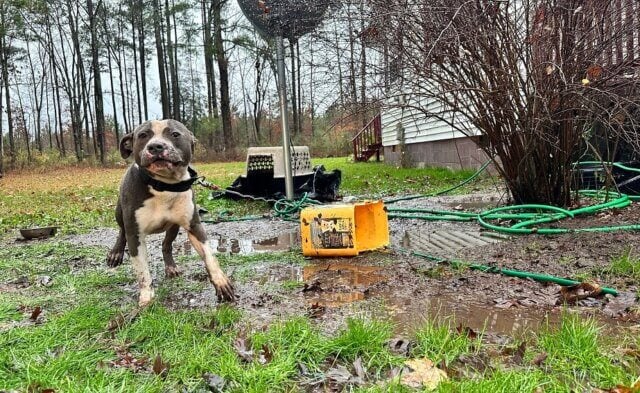Binnie was in big trouble. After six years of cycling in and out of heat and giving birth to litter after litter of kittens, this shy cat had developed a severe infection of the uterus called pyometra. This painful condition can afflict animals who haven’t been spayed, and without prompt and aggressive treatment, it’s almost always fatal.
Fortunately, her guardian had made an appointment with PETA’s SNIP clinic, which sterilizes thousands of animals at low to no cost each year. During Binnie’s spay procedure, a PETA veterinarian discovered the infection and gave her the surgery and follow-up care (including administering fluids and antibiotics) that saved her life.
Spaying and neutering are lifesavers, yet some people delay providing their animal companions with this essential care—or never have them sterilized at all—due to myths and misunderstandings. It’s time to clear those up.
Preventing pregnancies tops the list of reasons to spay or neuter early. Animal shelters across the U.S. are overflowing with homeless animals, and “kitten season”—when warmer weather results in more breeding opportunities—exponentially worsens the companion animal overpopulation crisis. Rather than providing shelter, many facilities now turn away vulnerable animals, leaving them in the hands of neglectful people or on the streets, where they suffer and die in agony. Spaying and neutering stop this cycle of birth, homelessness, suffering and death.
Recently, PETA received a call from a woman whose cat, Stella, had given birth to two kittens. She was surprised to learn that her cat could quickly become pregnant again, even while still nursing. She was eager to do the right thing and made an appointment for PETA to pick up her feline friend, spay her as soon as the kittens had been weaned and transfer the little ones to a shelter where they’d be sterilized before adoption.
Some people think they should wait until animals are older to have them sterilized, but there’s no good reason to do that—and there are many good reasons to get them “fixed” as early as possible. People who drag their feet often find out the hard way that their kitten or puppy can create litters themselves when they’re as young as 4 to 5 months of age.
Kittens and puppies can safely be sterilized when they’re around 8 weeks old. Surgery is typically less stressful for younger animals, and they recuperate faster. It’s a vital investment in their health. Being spayed before their first heat cycle significantly reduces females’ risk of developing mammary cancer.
Spaying also eliminates female animals’ risk of suffering from diseases of the ovaries and uterus—including cancer—which are painful, expensive to treat and often fatal. Giving males “the snip” can protect their health by diminishing their risk of developing prostate cancer and eliminating any chance of testicular cancer. Animals who have been sterilized are also less likely to contract deadly diseases that spread via bodily fluids, including feline AIDS and feline leukemia.
And no, spaying and neutering don’t affect animals’ weight. Cats and dogs become overweight and inactive because their guardians feed them too much and don’t provide them with enough exercise—not because they’ve been sterilized. Work with your veterinarian to ensure that you’re meeting your animals’ nutritional needs, and set aside time daily to play with cats and walk dogs.
But will their personalities change? Rest assured that your animal companions will still be the same individuals you knew and loved before they were spayed or neutered. Sterilization will only reduce or eliminate behavior you don’t like, such as aggression and urine marking. Neutered males are less likely to roam, fight or spray territorially. Spayed females are spared the stress, discomfort and hormonal swings of heat cycles. Another plus: Sterilized animals are typically more interested in bonding with their guardians than trying to slip out of the house in search of a mate.
So, if you still haven’t made an appointment to have Max or Molly snipped, what are you waiting for? Wherever you live, there is likely a low-cost or free spay/neuter program near you. And if you’ve already done the right thing for your animal companions, why not “spay it forward” by helping a friend or neighbor have theirs “fixed,” too?





